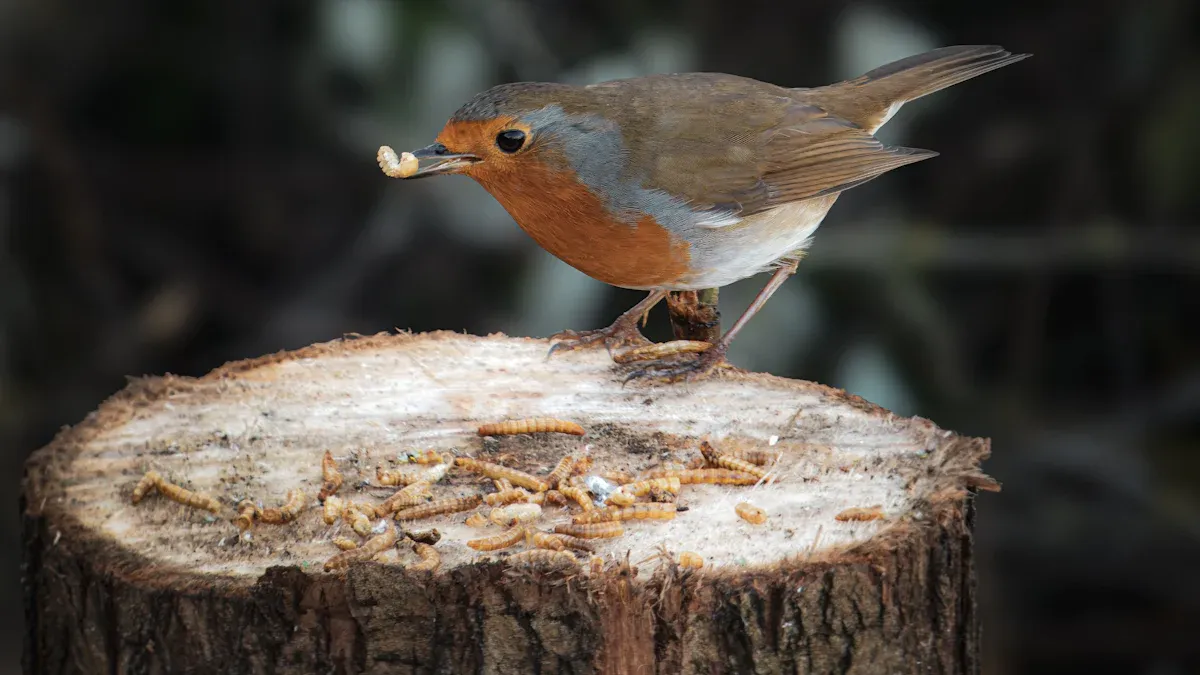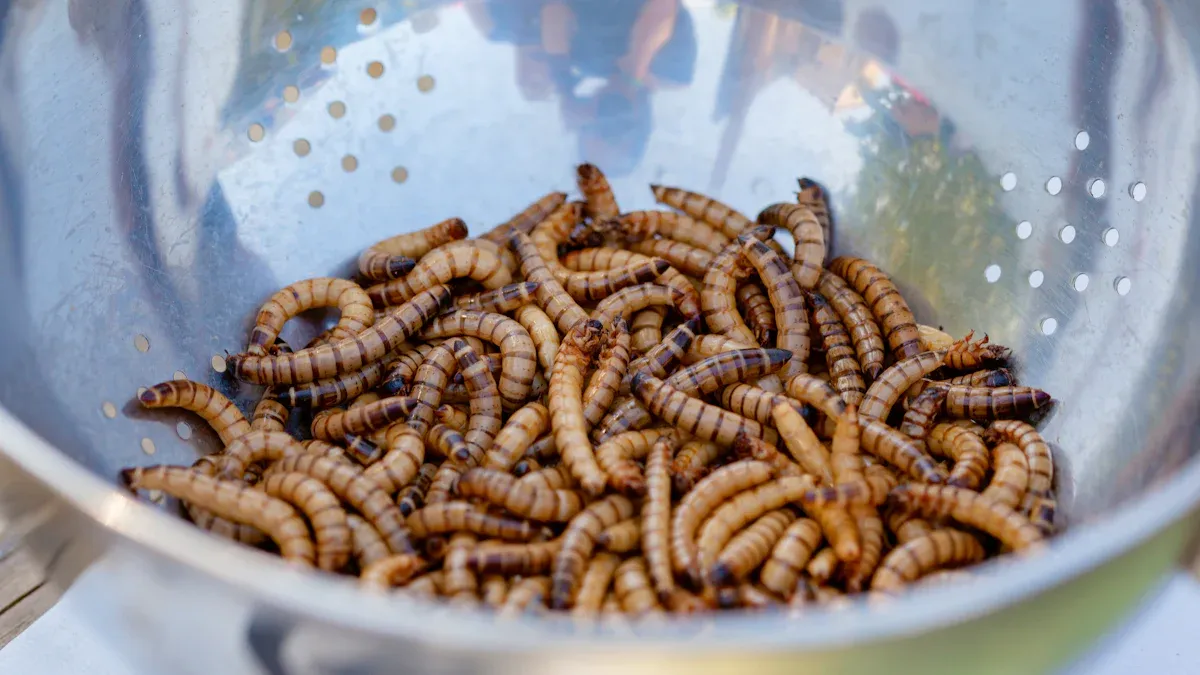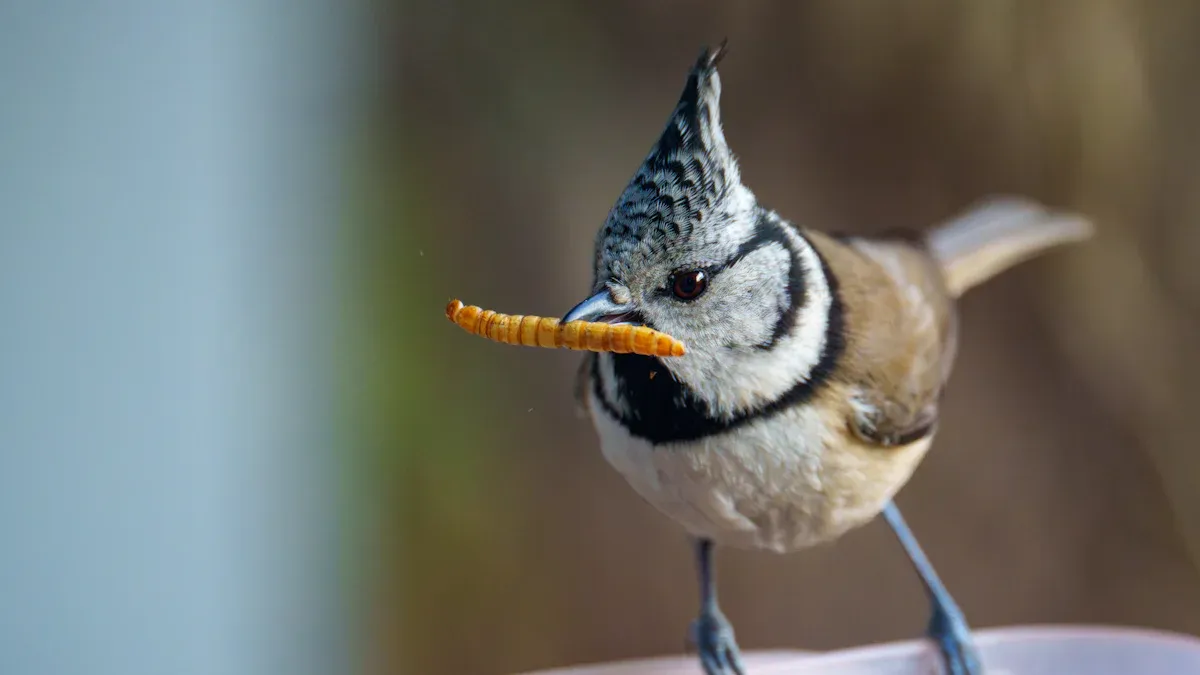
Mealworms bird food offers backyard birds a rich source of protein, healthy fats, and vital nutrients. Many birds find dried mealworms appealing and easy to eat. > Tip: Mix mealworms into regular bird seed or serve them alone to attract more birds and support their daily energy needs.
Key Takeaways
- Mealworms bird food provides backyard birds with high protein, healthy fats, and essential vitamins that help them stay strong, active, and healthy.
- Offering mealworms in feeders or mixed with regular seed attracts many bird species and supports their natural diet and behavior.
- Regular feeding of mealworms helps birds grow bright feathers, maintain energy, and survive harsh weather, making your backyard a lively place for birds year-round.
Nutritional Power of Mealworms Bird Food

High Protein Content
Mealworms bird food stands out for its high protein content. Birds need protein to grow strong feathers and muscles. Protein also helps birds recover after long flights or cold nights. Many backyard birds, such as robins and bluebirds, seek out insects in nature because they are rich in protein. Mealworms provide a similar benefit in a convenient form. When added to a regular bird seed mix or served alone, mealworms bird food gives birds the extra protein they need to stay healthy and active.
Essential Fats and Amino Acids
Birds require healthy fats and amino acids for energy and overall health. Mealworms bird food contains a balanced amount of fat, which helps birds keep warm during cold weather. Amino acids, the building blocks of protein, support growth and repair in bird bodies. Dried mealworms offer a natural source of these nutrients. Birds can easily digest mealworms, making them an excellent choice for both young and adult birds.
Tip: Homemade fat balls with crushed mealworms can be a cost-effective way to supplement birds’ diets, especially during winter months.
Rich in Vitamins and Minerals
Mealworms bird food supplies important vitamins and minerals that support bird health. These nutrients help birds maintain strong bones, sharp eyesight, and a healthy immune system. Vitamins like B12 and minerals such as iron and zinc are present in mealworms. Birds that eat mealworms often show more energy and brighter feathers.
- Some users note that mealworms can be more expensive than other bird foods, but they are available in tubs at many stores and offer high quality.
- Homemade mixes, such as fat balls with crushed mealworms, can help reduce costs while still providing excellent nutrition.
- Mealworms bird food appeals to a bird’s natural instincts and encourages more species to visit backyard feeders.
Mealworms bird food delivers a powerful blend of protein, fats, and essential nutrients. By simply mixing mealworms into regular bird seed or offering them alone in a feeder, backyard bird lovers can help their feathered friends thrive.
Why Mealworms Bird Food Is Ideal for Backyard Birds

Natural Part of Birds’ Diet
Wild birds often search for insects as a main food source. Mealworms bird food closely matches what birds eat in nature. Many backyard birds, such as chickadees and wrens, naturally hunt for mealworms and other insects. This food appeals to their instincts and encourages natural foraging behavior. When people offer mealworms bird food, they help birds find a familiar and trusted food source right in their own yard.
Note: Birds recognize mealworms as a safe and nutritious option. This makes it easier for them to adapt to new feeders or food mixes.
Easy to Eat and Digest
Mealworms bird food comes in a form that birds can easily pick up and swallow. Dried mealworms are lightweight and do not spoil quickly. Birds of all ages can eat them without trouble. Young birds, in particular, benefit from the soft texture and high digestibility. Their bodies absorb the nutrients quickly, which supports healthy growth and development.
- Dried mealworms do not require special preparation.
- Birds can eat them straight from a dish or feeder.
- The food breaks down easily in a bird’s digestive system.
Suitable for Many Bird Species
A wide range of backyard birds enjoy mealworms bird food. Bluebirds, robins, woodpeckers, and even some finches visit feeders that offer mealworms. This food attracts both insect-eating and seed-eating birds. People who want to see more bird species in their yard often choose mealworms bird food for this reason.
| Bird Species | Attracted by Mealworms Bird Food? |
|---|---|
| Bluebirds | ✅ |
| Chickadees | ✅ |
| Robins | ✅ |
| Woodpeckers | ✅ |
| Wrens | ✅ |
Tip: Mix mealworms bird food with regular seed to appeal to even more types of birds.
Positive Impact on Bird Health and Behavior
Mealworms bird food supports strong health in backyard birds. The protein, fats, and vitamins in mealworms help birds grow bright feathers and maintain energy. Birds that eat mealworms often show more active and social behavior. They visit feeders more often and stay longer in the yard. Healthy birds also have a better chance of surviving harsh weather and raising strong chicks.
People notice that birds fed with mealworms bird food look more vibrant and alert. This food helps birds stay active throughout the year, especially during breeding and migration seasons.
- Mealworms bird food gives birds the nutrition they need to stay strong and healthy.
- Many birds visit yards where people offer this food.
- Choosing this option helps local birds remain active in every season.
Tip: Mix mealworms with seeds to attract even more species.
FAQ
What is the best way to serve mealworms bird food?
Bird lovers can mix mealworms with regular seed or place them alone in a dish or hopper feeder. Birds will find and eat them quickly.
Tip: Try both methods to see which attracts more birds.
Which birds eat mealworms bird food?
Bluebirds, robins, chickadees, wrens, and woodpeckers enjoy mealworms. Many other backyard birds also eat them because mealworms match their natural diet.
How often should people offer mealworms to backyard birds?
People can offer mealworms daily. Birds benefit from regular feeding, especially during nesting, migration, or cold weather.
- Consistent feeding helps birds stay healthy.
- Adjust the amount based on bird activity.


